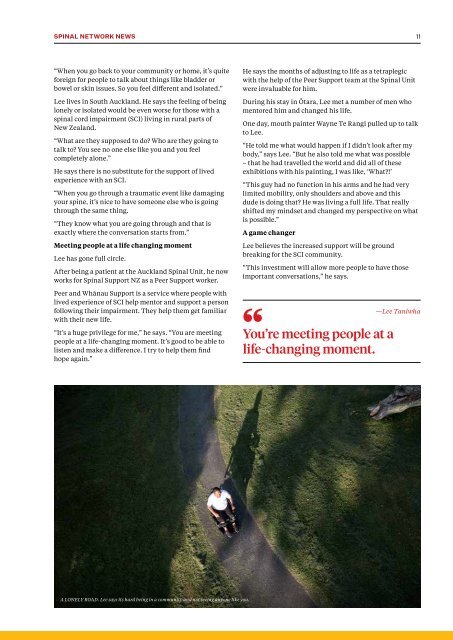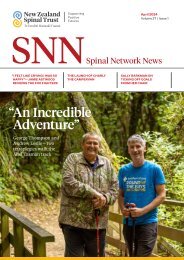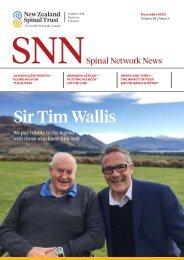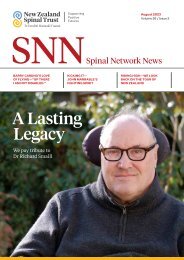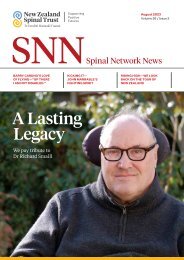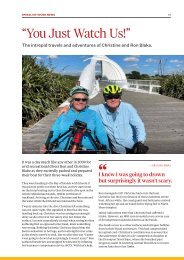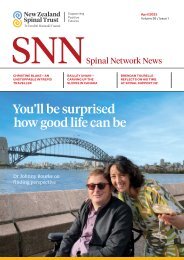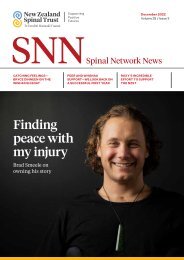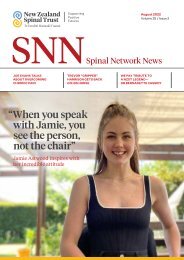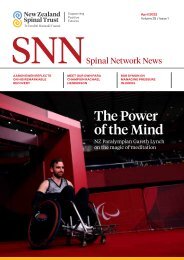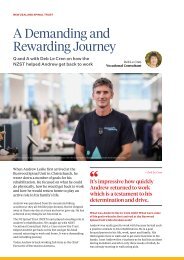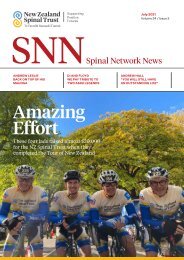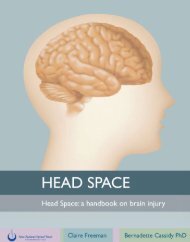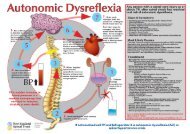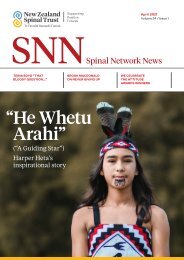Create successful ePaper yourself
Turn your PDF publications into a flip-book with our unique Google optimized e-Paper software.
SPINAL NETWORK NEWS 11<br />
“When you go back to your community or home, it’s quite<br />
foreign for people to talk about things like bladder or<br />
bowel or skin issues. So you feel different and isolated.”<br />
Lee lives in South Auckland. He says the feeling of being<br />
lonely or isolated would be even worse for those with a<br />
spinal cord impairment (SCI) living in rural parts of<br />
New Zealand.<br />
“What are they supposed to do? Who are they going to<br />
talk to? You see no one else like you and you feel<br />
completely alone.”<br />
He says there is no substitute for the support of lived<br />
experience with an SCI.<br />
“When you go through a traumatic event like damaging<br />
your spine, it’s nice to have someone else who is going<br />
through the same thing.<br />
“They know what you are going through and that is<br />
exactly where the conversation starts from.”<br />
Meeting people at a life changing moment<br />
Lee has gone full circle.<br />
After being a patient at the Auckland Spinal Unit, he now<br />
works for Spinal Support NZ as a Peer Support worker.<br />
Peer and Whānau Support is a service where people with<br />
lived experience of SCI help mentor and support a person<br />
fol<strong>low</strong>ing their impairment. They help them get familiar<br />
with their new life.<br />
“It’s a huge privilege for me,” he says. “You are meeting<br />
people at a life-changing moment. It’s good to be able to<br />
listen and make a difference. I try to help them find<br />
hope again.”<br />
He says the months of adjusting to life as a tetraplegic<br />
with the help of the Peer Support team at the Spinal Unit<br />
were invaluable for him.<br />
During his stay in Ōtara, Lee met a number of men who<br />
mentored him and changed his life.<br />
One day, mouth painter Wayne Te Rangi pulled up to talk<br />
to Lee.<br />
“He told me what would happen if I didn’t look after my<br />
body,” says Lee. “But he also told me what was possible<br />
– that he had travelled the world and did all of these<br />
exhibitions with his painting, I was like, ‘What?!’<br />
“This guy had no function in his arms and he had very<br />
limited mobility, only shoulders and above and this<br />
dude is doing that? He was living a full life. That really<br />
shifted my mindset and changed my perspective on what<br />
is possible.”<br />
A game changer<br />
Lee believes the increased support will be ground<br />
breaking for the SCI community.<br />
“This investment will al<strong>low</strong> more people to have those<br />
important conversations,” he says.<br />
You’re meeting people at a<br />
life-changing moment.<br />
—Lee Taniwha<br />
A LONELY ROAD. Lee says its hard being in a community and not seeing anyone like you.


